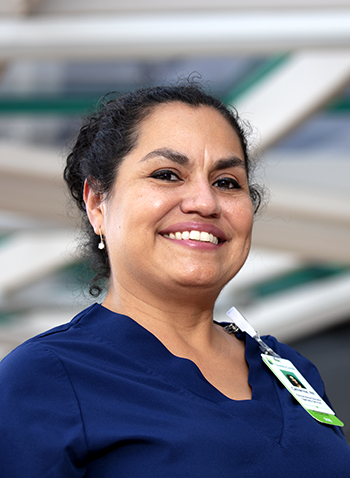Spotlight on St. Joseph’s/Candler nurse Catherine Otero
Catherine Otero, RN, MSN, Ed, CV-BC
Clinical Quality Educator
Educational lead on the St. Joseph’s/Candler-Savannah Technical College CNA and PCT Apprenticeship Program
Nursing for 26 years, one year at St. Joseph’s/Candler
SJ/C: Why did you decide to become a nurse?

Catherine: I always knew I wanted to be a nurse. My aunt was in the Women’s Army Auxiliary Corps (WAAC). That was the first group of women that were taken to join the US Army to be trained like nurses. She always talked about Vietnam and her patients. And then on top of that, my mom had polio from when she was around 2 years old. So, I had a mom who was handicapped. She was a very independent woman even though she was paralyzed from the waist down, so that also really pushed me towards nursing. I just always knew I wanted to be a nurse. Nursing wasn’t just a job for me; it was a calling.
SJ/C: Why did you choose to come work at St. Joseph’s/Candler?
Catherine: One of the big reasons was growth. I had a Master’s degree, and I was in a Bachelor’s degree position. I wanted to do more professionally. So, I came here because of the opportunity for growth. There was no growth where I was previously at. I also really love education, and there just happened to be a position open in nursing education. It gave me the opportunity to use the skills I learned while working at the University of Hawaii as a then military wife and put them to use in Savannah in a hospital setting.
My true love is education. I know some nurses feel like, ‘Well, the educators, they are not bedside anymore.’ But I feel like I can instill some of that love of the patient, of the nurse back into the students that I touch every day. Whatever courses I teach, I always tell them: ‘Remember, your patient is a person. They’ve experienced something life-changing, and they have a story. If you get to know their story, you might be amazed at what you’d find out about that patient.’
SJ/C: What are your day-to-day responsibilities as a clinical quality educator?
Catherine: Every Monday, I teach a PCT course. I teach the PCT apprenticeship course as part of the partnership that St. Joseph’s/Candler has with Savannah Technical College. When a new CNA apprenticeship group comes through orientation, I take them for three to four days. I created a separate orientation for them. We do a different focus every day for them. I make sure they have all the requirements to attend Savannah Tech, such as Basic Life Support certification. So, I am kind of a liaison between here and Savannah Tech for the semester.
I’m also planning ahead for the next cohort of our Nursing Student Extender program that will start later this fall, and then planning for the next PCT course that’ll start in January. In between, I’ve been doing interviews to hire the
CNA apprentices, and then the PCT apprentices as well.
SJ/C: It sounds like you really enjoy this role and this side of nursing. Was it a transition going from bedside to education?
Catherine: No, it wasn’t for me. Even when I worked bedside, I was always the nurse that took the students, that oriented the new staff and was always in charge. I always did education stuff on the side. I taught ACLS (advanced cardiac life support) for more than 15 years. I’ve always been teaching, so I’ve always enjoyed that.
SJ/C: What does it mean to you to be a Magnet nurse?
Catherine: To me, being a Magnet nurse means that nursing has a say in healthcare; has a say in what is best for the patient and for my own practice. So, for me that is very important that I have that say, because I worked for many years at a place where it didn’t matter what I said. Here, it’s like, ‘OK, there is more than one way to do something, Let’s hear your idea.’
SJ/C: What advice do you offer to new nurses or those considering a career in nursing?
Catherine: It’s not an easy job. You have to love people. If you don’t have people skills and if you are here because it’s just about making money, you’re in the wrong place. The patient will know. It’s like how an animal smells fear. The patient just knows if you care or don’t care. And so, you have to really love it. That’s what we’re looking for in the PCT, CNA apprenticeship program.
I’m all about bringing care back into nursing. I think you can teach anything. You can learn anything and study anything, but you can’t teach a person to care. It is either a part of you and a habit or it is not. So when I interview, I am looking for that piece. I don’t need the smartest person. I can teach you anything, and I really feel anybody can learn. But I cannot teach compassion.
The first few years of nursing are hard. There’s so much to learn and it can be overwhelming until you find a good workflow. So I tell you, ‘Don’t give up. Remember why you started this in the first place and just hold on to that. And
keep moving; you can always progress.'
Family: Daughter who just graduated in BioChem Forensics from University Central Florida and wants to earn a medical degree
Hobbies/Interests: Teaching outside of work – nursing but also Latin dance